牛津深圳版英语八年级上期末总复习课文默写Units 1-8( 含答案)
文档属性
| 名称 | 牛津深圳版英语八年级上期末总复习课文默写Units 1-8( 含答案) | 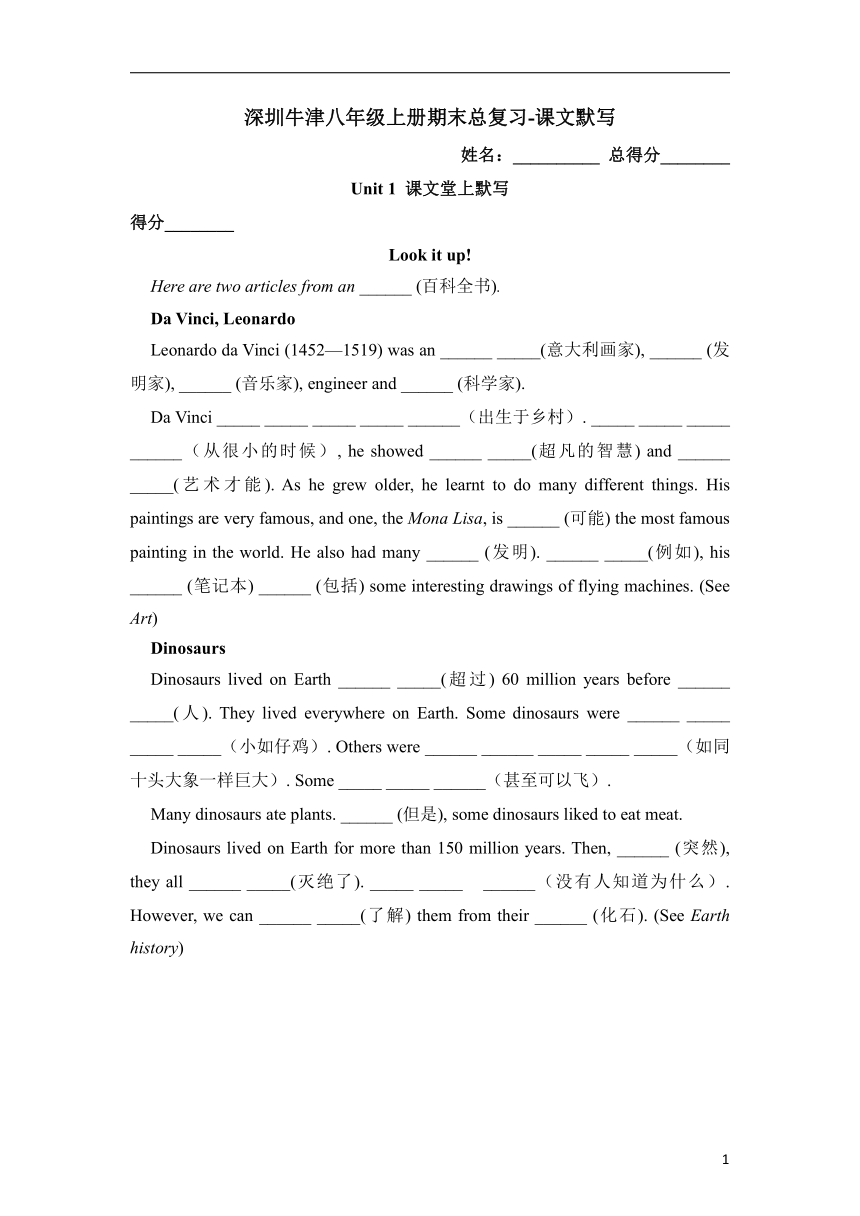 | |
| 格式 | docx | ||
| 文件大小 | 31.9KB | ||
| 资源类型 | 教案 | ||
| 版本资源 | 牛津深圳版 | ||
| 科目 | 英语 | ||
| 更新时间 | 2021-12-31 14:46:06 | ||
图片预览

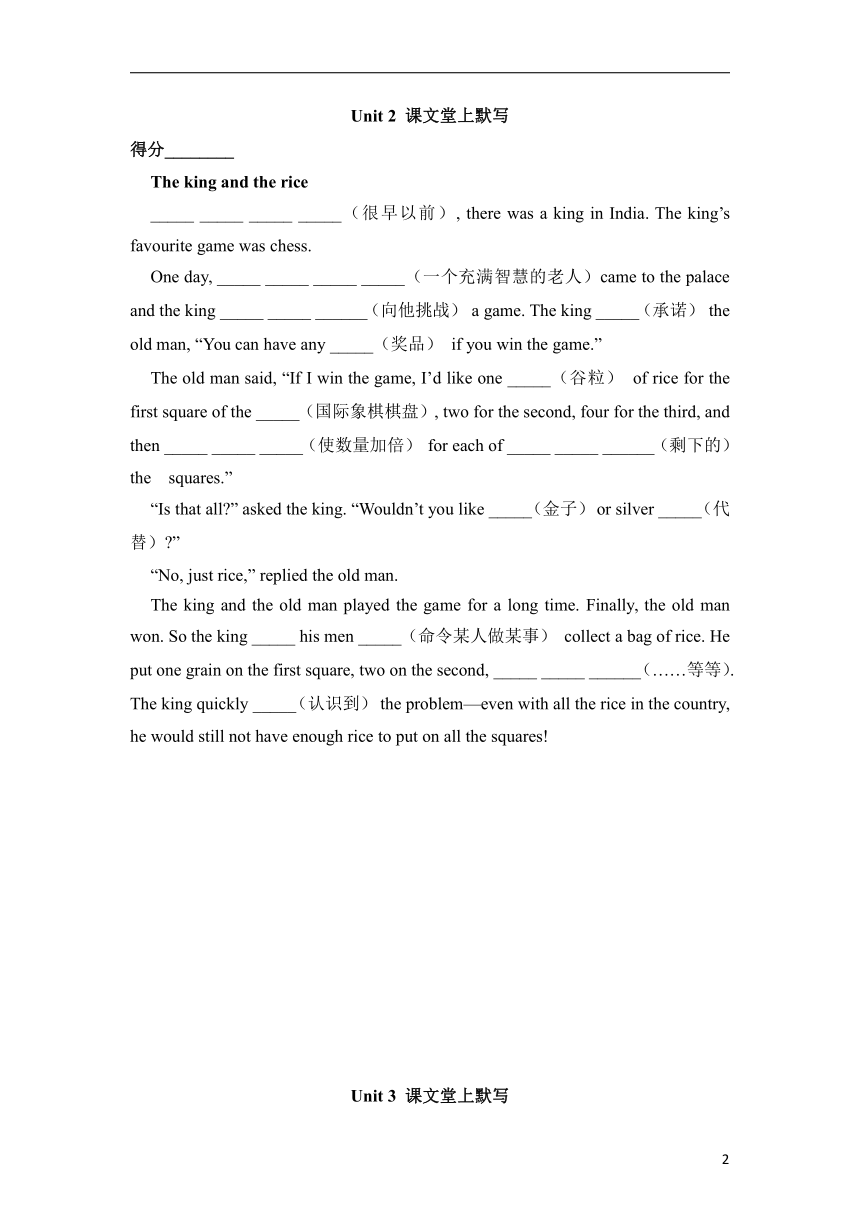
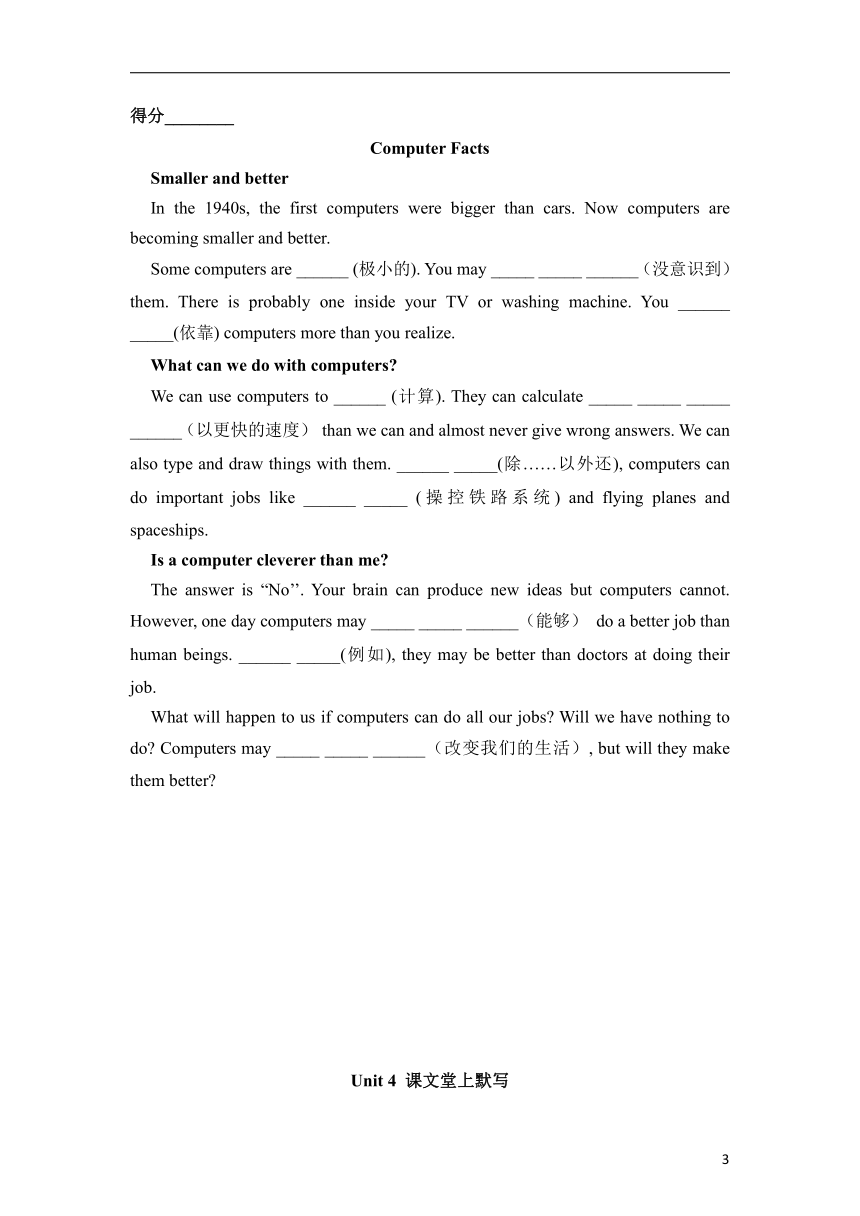
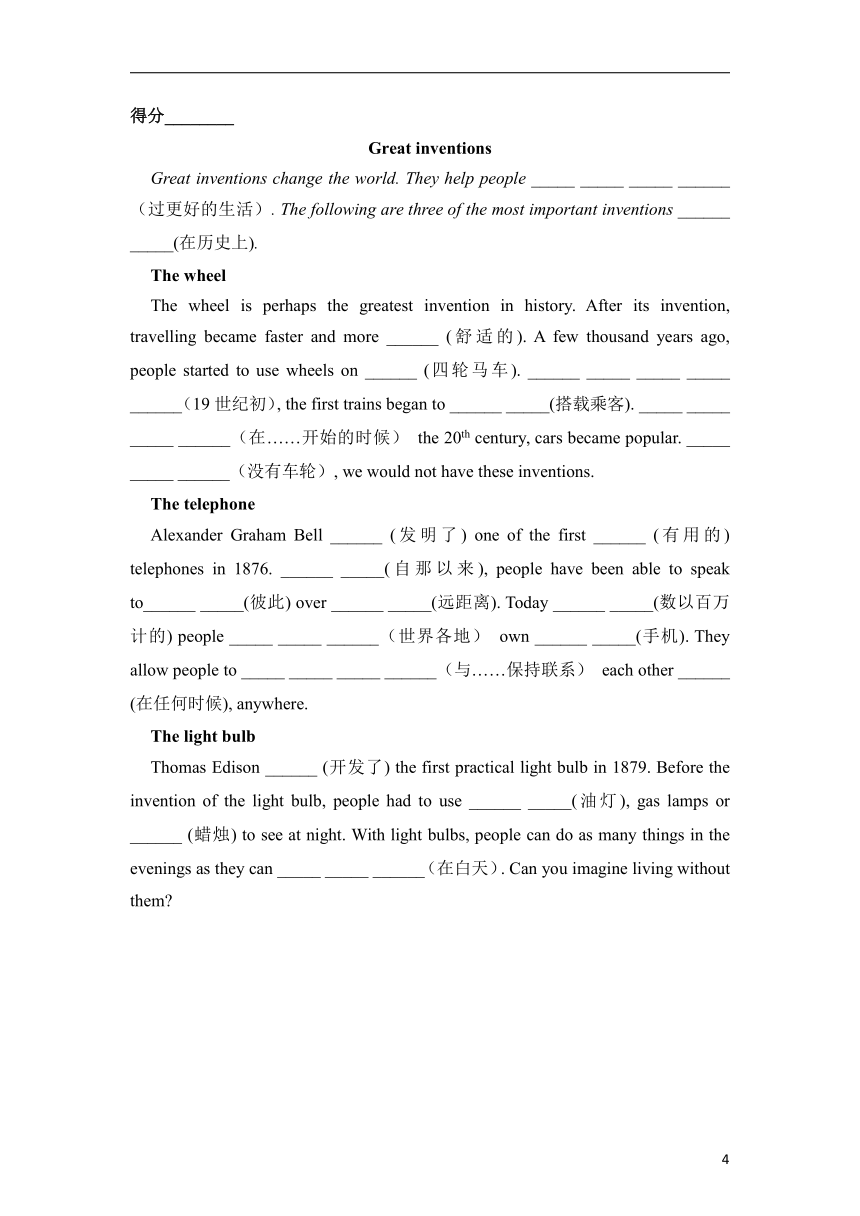
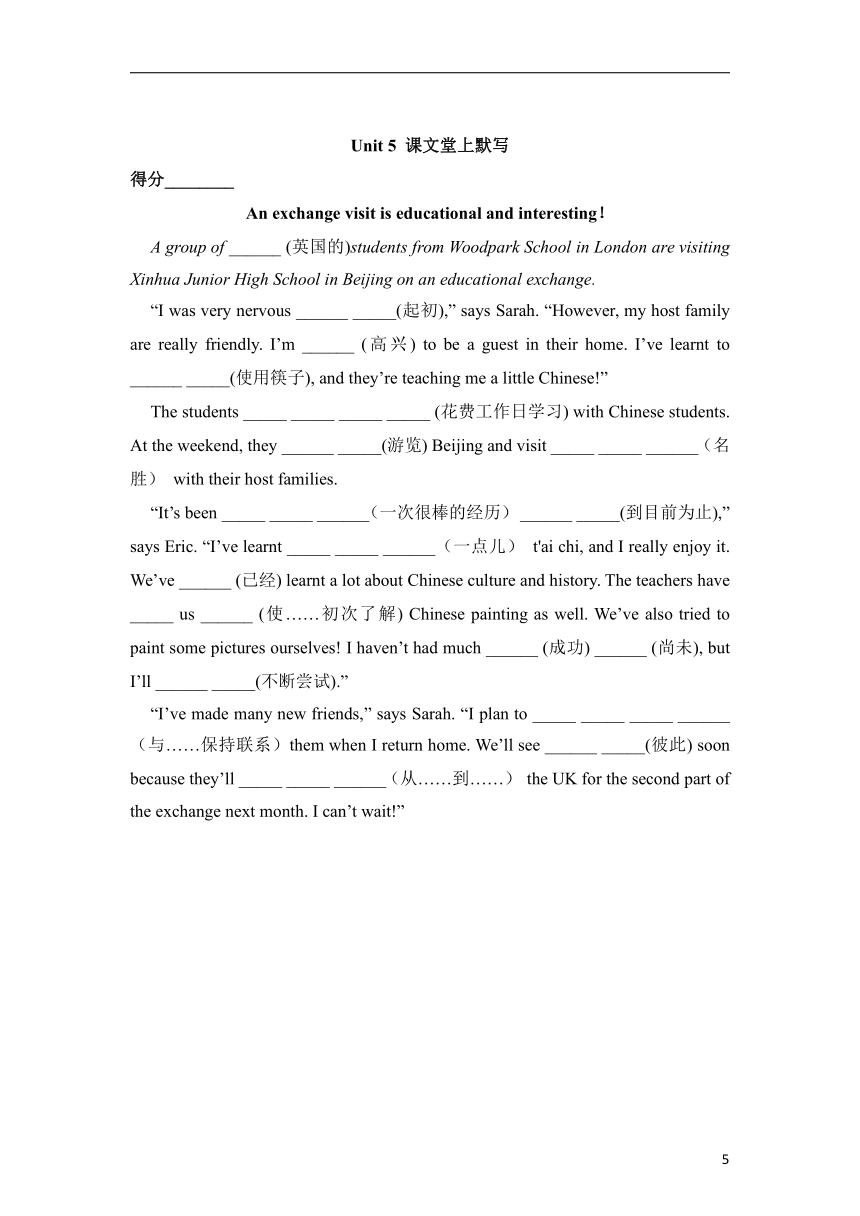
文档简介
深圳牛津八年级上册期末总复习-课文默写
姓名:__________ 总得分________
Unit 1 课文堂上默写
得分________
Look it up!
Here are two articles from an ______ (百科全书).
Da Vinci, Leonardo
Leonardo da Vinci (1452—1519) was an ______ _____(意大利画家), ______ (发明家), ______ (音乐家), engineer and ______ (科学家).
Da Vinci _____ _____ _____ _____ ______(出生于乡村). _____ _____ _____ ______(从很小的时候), he showed ______ _____(超凡的智慧) and ______ _____(艺术才能). As he grew older, he learnt to do many different things. His paintings are very famous, and one, the Mona Lisa, is ______ (可能) the most famous painting in the world. He also had many ______ (发明). ______ _____(例如), his ______ (笔记本) ______ (包括) some interesting drawings of flying machines. (See Art)
Dinosaurs
Dinosaurs lived on Earth ______ _____(超过) 60 million years before ______ _____(人). They lived everywhere on Earth. Some dinosaurs were ______ _____ _____ _____(小如仔鸡). Others were ______ ______ _____ _____ _____(如同十头大象一样巨大). Some _____ _____ ______(甚至可以飞).
Many dinosaurs ate plants. ______ (但是), some dinosaurs liked to eat meat.
Dinosaurs lived on Earth for more than 150 million years. Then, ______ (突然), they all ______ _____(灭绝了). _____ _____ ______(没有人知道为什么). However, we can ______ _____(了解) them from their ______ (化石). (See Earth history)
Unit 2 课文堂上默写
得分________
The king and the rice
_____ _____ _____ _____(很早以前), there was a king in India. The king’s favourite game was chess.
One day, _____ _____ _____ _____(一个充满智慧的老人)came to the palace and the king _____ _____ ______(向他挑战) a game. The king _____(承诺) the old man, “You can have any _____(奖品) if you win the game.”
The old man said, “If I win the game, I’d like one _____(谷粒) of rice for the first square of the _____(国际象棋棋盘), two for the second, four for the third, and then _____ _____ _____(使数量加倍) for each of _____ _____ ______(剩下的)the squares.”
“Is that all ” asked the king. “Wouldn’t you like _____(金子) or silver _____(代替) ”
“No, just rice,” replied the old man.
The king and the old man played the game for a long time. Finally, the old man won. So the king _____ his men _____(命令某人做某事) collect a bag of rice. He put one grain on the first square, two on the second, _____ _____ ______(……等等). The king quickly _____(认识到) the problem—even with all the rice in the country, he would still not have enough rice to put on all the squares!
Unit 3 课文堂上默写
得分________
Computer Facts
Smaller and better
In the 1940s, the first computers were bigger than cars. Now computers are becoming smaller and better.
Some computers are ______ (极小的). You may _____ _____ ______(没意识到)them. There is probably one inside your TV or washing machine. You ______ _____(依靠) computers more than you realize.
What can we do with computers
We can use computers to ______ (计算). They can calculate _____ _____ _____ ______(以更快的速度) than we can and almost never give wrong answers. We can also type and draw things with them. ______ _____(除……以外还), computers can do important jobs like ______ _____ (操控铁路系统) and flying planes and spaceships.
Is a computer cleverer than me
The answer is “No’’. Your brain can produce new ideas but computers cannot. However, one day computers may _____ _____ ______(能够) do a better job than human beings. ______ _____(例如), they may be better than doctors at doing their job.
What will happen to us if computers can do all our jobs Will we have nothing to do Computers may _____ _____ ______(改变我们的生活), but will they make them better
Unit 4 课文堂上默写
得分________
Great inventions
Great inventions change the world. They help people _____ _____ _____ ______(过更好的生活). The following are three of the most important inventions ______ _____(在历史上).
The wheel
The wheel is perhaps the greatest invention in history. After its invention, travelling became faster and more ______ (舒适的). A few thousand years ago, people started to use wheels on ______ (四轮马车). ______ _____ _____ _____ ______(19世纪初), the first trains began to ______ _____(搭载乘客). _____ _____ _____ ______(在……开始的时候) the 20th century, cars became popular. _____ _____ ______(没有车轮), we would not have these inventions.
The telephone
Alexander Graham Bell ______ (发明了) one of the first ______ (有用的) telephones in 1876. ______ _____(自那以来), people have been able to speak to______ _____(彼此) over ______ _____(远距离). Today ______ _____(数以百万计的) people _____ _____ ______(世界各地) own ______ _____(手机). They allow people to _____ _____ _____ ______(与……保持联系) each other ______ (在任何时候), anywhere.
The light bulb
Thomas Edison ______ (开发了) the first practical light bulb in 1879. Before the invention of the light bulb, people had to use ______ _____(油灯), gas lamps or ______ (蜡烛) to see at night. With light bulbs, people can do as many things in the evenings as they can _____ _____ ______(在白天). Can you imagine living without them
Unit 5 课文堂上默写
得分________
An exchange visit is educational and interesting!
A group of ______ (英国的)students from Woodpark School in London are visiting Xinhua Junior High School in Beijing on an educational exchange.
“I was very nervous ______ _____(起初),” says Sarah. “However, my host family are really friendly. I’m ______ (高兴) to be a guest in their home. I’ve learnt to ______ _____(使用筷子), and they’re teaching me a little Chinese!”
The students _____ _____ _____ _____ (花费工作日学习) with Chinese students. At the weekend, they ______ _____(游览) Beijing and visit _____ _____ ______(名胜) with their host families.
“It’s been _____ _____ ______(一次很棒的经历) ______ _____(到目前为止),” says Eric. “I’ve learnt _____ _____ ______(一点儿) t'ai chi, and I really enjoy it. We’ve ______ (已经) learnt a lot about Chinese culture and history. The teachers have _____ us ______ (使……初次了解) Chinese painting as well. We’ve also tried to paint some pictures ourselves! I haven’t had much ______ (成功) ______ (尚未), but I’ll ______ _____(不断尝试).”
“I’ve made many new friends,” says Sarah. “I plan to _____ _____ _____ ______(与……保持联系)them when I return home. We’ll see ______ _____(彼此) soon because they’ll _____ _____ ______(从……到……) the UK for the second part of the exchange next month. I can’t wait!”
Unit 6 课文堂上默写
得分________
The Trojan horse
The ______ (首领) stood on the high wall of the city of Troy. “The ______ (希腊人) have gone and we’ve won,” he said. “They’ve tried to ______ (攻占) our city for ten years. Now they’ve ______ _____(放弃) and sailed away!”
“But look over there,” a ______ (士兵) said. “They’ve left a ______ (巨大的) wooden horse.”
“Ah, yes,” the captain said, “it’s too big. The Greeks didn’t want to _____ _____ _____ ______(随身带走它). Get some help and _____ it ______ (把……拖进) the city.”
That night, in the ______ _____(主广场) of the city, all the Trojans ______ (庆祝). They sang and danced around the horse, and _____ _____ ______(拿……开玩笑) the ______ (笨的) Greeks. “I haven’t laughed like this since my childhood,” the captain said. After the party, they locked all the gates of the city and then all went to sleep.
______ _____(在午夜前), the main square was ______ (空的), ______ _____(除……之外) the huge horse. Suddenly a ______ _____(暗门) opened _____ _____ _____ ______(在……侧面) the wooden horse. The horse _____ _____ ______(有大量的)Greek soldiers! They ______ (安静地) climbed out of the horse _____ _____ ______(一个接一个).
The soldiers opened the main gates. The Greek ______ (军队) ______ (进入了) the city.
For ten years, the Greeks could not capture the city by fighting. In one night, however, they ______ _____(成功做到) capturing it through _____ _____ ______(一条聪明的计谋).
Unit 7 课文堂上默写
得分________
Memory Corner
Henry, Paula and Millie write for the school newspaper. They have written the short articles below to help students improve their memory.
Henry
A great way to help you remember something is to imagine a picture of it _____ _____ ______(在你的脑海里). If you make the picture big,
strange or ______ (可笑的), you will remember it better. ______ _____(例如), to remember the word “smiles”, we can imagine there is a “______ (英里)” _____ the first letter ______ (在……和……之间) the last letter. This makes it the longest word in the world. Remember: a picture is ______ (值得) a thousand words.
Paula
A good method for remembering the spelling of a word is to _____ _____ _____ ______(造一个短句) with each letter of the word.
For example, if you want to remember _____ _____ ______(怎么拼写) the word “because”, you can use the sentence “Big elephants
can always understand small elephants.”
Millie
You will forget something very quickly ______ (除非) you understand it well. For example, you may _____ _____ ______(记住……有困难) the ______ (清单) of ______ (步骤) in the ______ _____(水循环). However, it is easier to remember these steps if you understand how the water cycle works.
Unit 8 课文堂上默写
得分________
English: fun for life
Last week, students at Rosie Bridge School worked hard to make their English Week _____ _____ ______(一次成功的事).
There was an English book fair in the library and a treasure hunt. Some students ______ _____(上演) an English play. Other students _____ _____ ______(参加了) an English ______ _____(歌唱比赛).
There was also a speaking competition. The students had to speak _____ _____ ______(关于某个主题)in English for two minutes.
We spoke to the ______ (优胜者), Henry. “I’m so happy that I won,” he said. “I _____ people ______ (建议……做……) speak slowly. If they want to be good public speakers, ______ _____(他们最好) speak clearly and confidently.”
We also spoke to ______ (几个) other students about English Week. One of them was Amy.
“I really enjoyed English Week. It gave me a chance to learn new words. _____ _____ ______(依我看), every school should have an English Week. _____ _____ ______ _____(它很值得做),” she said.
On the last day of English Week, the head teacher _____ _____ ______(发表演讲) to _____ _____ ______(整个学校). He gave students some ______ (建议) on how to improve their English. “You should ______ (交流) in English with your friends ______ (在任何……的时候) you can. You should read English books and magazines, and watch English television programmes. ______ _____(最重要的是), you should enjoy English!” he said.
参考答案:
Unit 1
encyclopaedia, Italian painter, inventor, musician, scientist, was born in the countryside, From an early age, great intelligence, artistic ability, perhaps, inventions, For example, notebooks, include
more than, human beings, as small as chickens, as big as ten elephants, can even fly, However, suddenly, died out, Nobody knows why, learn about, fossils
Unit 2
A long time ago, a wise old man, challenged him to, promised, prize, grain, chessboard, double the amount, the rest of, gold, instead, ordered, to, and so on, realized
Unit 3
tiny, be unaware of, depend on, calculate, at a faster speed, In addition, operating railways, be able to, For example, change our lives
Unit 4
live a better life, in history, comfortable, carriages, In the early 19th century, carry passengers, At the start of, without wheels, invented, practical, Since then, each other, long distances, millions of, across the world, mobile phones, keep in touch with, anytime, developed, oil lamps, candles, in the daytime
Unit 5
British, at first, glad, use chopsticks, spend the weekdays studying, tour around, places of interest, a fantastic experience, so far, a bit of, already, introduce to, success, yet, keep trying, keep in touch with, one another, come over to
Unit 6
captain, Greeks, capture, given up, soldier, huge, take it with them, pull into, main square, celebrated, made jokes about, stupid, By midnight, empty, except for, secret door, on the side of, was full of, quietly, one by one, army, entered, succeeded in, a clever trick
Unit 7
in your mind, silly, For example, mile, between, and, worth, make a short sentence, how to spell, unless, have trouble remembering, list, steps, water cycle
Unit 8
a big success, put on, took part in, singing competition, on a topic, winner, advise, to, they’d better, several, in my opinion, It’s well worth doing, gave a speech, the whole school, suggestions, communicate, whenever, Above all
姓名:__________ 总得分________
Unit 1 课文堂上默写
得分________
Look it up!
Here are two articles from an ______ (百科全书).
Da Vinci, Leonardo
Leonardo da Vinci (1452—1519) was an ______ _____(意大利画家), ______ (发明家), ______ (音乐家), engineer and ______ (科学家).
Da Vinci _____ _____ _____ _____ ______(出生于乡村). _____ _____ _____ ______(从很小的时候), he showed ______ _____(超凡的智慧) and ______ _____(艺术才能). As he grew older, he learnt to do many different things. His paintings are very famous, and one, the Mona Lisa, is ______ (可能) the most famous painting in the world. He also had many ______ (发明). ______ _____(例如), his ______ (笔记本) ______ (包括) some interesting drawings of flying machines. (See Art)
Dinosaurs
Dinosaurs lived on Earth ______ _____(超过) 60 million years before ______ _____(人). They lived everywhere on Earth. Some dinosaurs were ______ _____ _____ _____(小如仔鸡). Others were ______ ______ _____ _____ _____(如同十头大象一样巨大). Some _____ _____ ______(甚至可以飞).
Many dinosaurs ate plants. ______ (但是), some dinosaurs liked to eat meat.
Dinosaurs lived on Earth for more than 150 million years. Then, ______ (突然), they all ______ _____(灭绝了). _____ _____ ______(没有人知道为什么). However, we can ______ _____(了解) them from their ______ (化石). (See Earth history)
Unit 2 课文堂上默写
得分________
The king and the rice
_____ _____ _____ _____(很早以前), there was a king in India. The king’s favourite game was chess.
One day, _____ _____ _____ _____(一个充满智慧的老人)came to the palace and the king _____ _____ ______(向他挑战) a game. The king _____(承诺) the old man, “You can have any _____(奖品) if you win the game.”
The old man said, “If I win the game, I’d like one _____(谷粒) of rice for the first square of the _____(国际象棋棋盘), two for the second, four for the third, and then _____ _____ _____(使数量加倍) for each of _____ _____ ______(剩下的)the squares.”
“Is that all ” asked the king. “Wouldn’t you like _____(金子) or silver _____(代替) ”
“No, just rice,” replied the old man.
The king and the old man played the game for a long time. Finally, the old man won. So the king _____ his men _____(命令某人做某事) collect a bag of rice. He put one grain on the first square, two on the second, _____ _____ ______(……等等). The king quickly _____(认识到) the problem—even with all the rice in the country, he would still not have enough rice to put on all the squares!
Unit 3 课文堂上默写
得分________
Computer Facts
Smaller and better
In the 1940s, the first computers were bigger than cars. Now computers are becoming smaller and better.
Some computers are ______ (极小的). You may _____ _____ ______(没意识到)them. There is probably one inside your TV or washing machine. You ______ _____(依靠) computers more than you realize.
What can we do with computers
We can use computers to ______ (计算). They can calculate _____ _____ _____ ______(以更快的速度) than we can and almost never give wrong answers. We can also type and draw things with them. ______ _____(除……以外还), computers can do important jobs like ______ _____ (操控铁路系统) and flying planes and spaceships.
Is a computer cleverer than me
The answer is “No’’. Your brain can produce new ideas but computers cannot. However, one day computers may _____ _____ ______(能够) do a better job than human beings. ______ _____(例如), they may be better than doctors at doing their job.
What will happen to us if computers can do all our jobs Will we have nothing to do Computers may _____ _____ ______(改变我们的生活), but will they make them better
Unit 4 课文堂上默写
得分________
Great inventions
Great inventions change the world. They help people _____ _____ _____ ______(过更好的生活). The following are three of the most important inventions ______ _____(在历史上).
The wheel
The wheel is perhaps the greatest invention in history. After its invention, travelling became faster and more ______ (舒适的). A few thousand years ago, people started to use wheels on ______ (四轮马车). ______ _____ _____ _____ ______(19世纪初), the first trains began to ______ _____(搭载乘客). _____ _____ _____ ______(在……开始的时候) the 20th century, cars became popular. _____ _____ ______(没有车轮), we would not have these inventions.
The telephone
Alexander Graham Bell ______ (发明了) one of the first ______ (有用的) telephones in 1876. ______ _____(自那以来), people have been able to speak to______ _____(彼此) over ______ _____(远距离). Today ______ _____(数以百万计的) people _____ _____ ______(世界各地) own ______ _____(手机). They allow people to _____ _____ _____ ______(与……保持联系) each other ______ (在任何时候), anywhere.
The light bulb
Thomas Edison ______ (开发了) the first practical light bulb in 1879. Before the invention of the light bulb, people had to use ______ _____(油灯), gas lamps or ______ (蜡烛) to see at night. With light bulbs, people can do as many things in the evenings as they can _____ _____ ______(在白天). Can you imagine living without them
Unit 5 课文堂上默写
得分________
An exchange visit is educational and interesting!
A group of ______ (英国的)students from Woodpark School in London are visiting Xinhua Junior High School in Beijing on an educational exchange.
“I was very nervous ______ _____(起初),” says Sarah. “However, my host family are really friendly. I’m ______ (高兴) to be a guest in their home. I’ve learnt to ______ _____(使用筷子), and they’re teaching me a little Chinese!”
The students _____ _____ _____ _____ (花费工作日学习) with Chinese students. At the weekend, they ______ _____(游览) Beijing and visit _____ _____ ______(名胜) with their host families.
“It’s been _____ _____ ______(一次很棒的经历) ______ _____(到目前为止),” says Eric. “I’ve learnt _____ _____ ______(一点儿) t'ai chi, and I really enjoy it. We’ve ______ (已经) learnt a lot about Chinese culture and history. The teachers have _____ us ______ (使……初次了解) Chinese painting as well. We’ve also tried to paint some pictures ourselves! I haven’t had much ______ (成功) ______ (尚未), but I’ll ______ _____(不断尝试).”
“I’ve made many new friends,” says Sarah. “I plan to _____ _____ _____ ______(与……保持联系)them when I return home. We’ll see ______ _____(彼此) soon because they’ll _____ _____ ______(从……到……) the UK for the second part of the exchange next month. I can’t wait!”
Unit 6 课文堂上默写
得分________
The Trojan horse
The ______ (首领) stood on the high wall of the city of Troy. “The ______ (希腊人) have gone and we’ve won,” he said. “They’ve tried to ______ (攻占) our city for ten years. Now they’ve ______ _____(放弃) and sailed away!”
“But look over there,” a ______ (士兵) said. “They’ve left a ______ (巨大的) wooden horse.”
“Ah, yes,” the captain said, “it’s too big. The Greeks didn’t want to _____ _____ _____ ______(随身带走它). Get some help and _____ it ______ (把……拖进) the city.”
That night, in the ______ _____(主广场) of the city, all the Trojans ______ (庆祝). They sang and danced around the horse, and _____ _____ ______(拿……开玩笑) the ______ (笨的) Greeks. “I haven’t laughed like this since my childhood,” the captain said. After the party, they locked all the gates of the city and then all went to sleep.
______ _____(在午夜前), the main square was ______ (空的), ______ _____(除……之外) the huge horse. Suddenly a ______ _____(暗门) opened _____ _____ _____ ______(在……侧面) the wooden horse. The horse _____ _____ ______(有大量的)Greek soldiers! They ______ (安静地) climbed out of the horse _____ _____ ______(一个接一个).
The soldiers opened the main gates. The Greek ______ (军队) ______ (进入了) the city.
For ten years, the Greeks could not capture the city by fighting. In one night, however, they ______ _____(成功做到) capturing it through _____ _____ ______(一条聪明的计谋).
Unit 7 课文堂上默写
得分________
Memory Corner
Henry, Paula and Millie write for the school newspaper. They have written the short articles below to help students improve their memory.
Henry
A great way to help you remember something is to imagine a picture of it _____ _____ ______(在你的脑海里). If you make the picture big,
strange or ______ (可笑的), you will remember it better. ______ _____(例如), to remember the word “smiles”, we can imagine there is a “______ (英里)” _____ the first letter ______ (在……和……之间) the last letter. This makes it the longest word in the world. Remember: a picture is ______ (值得) a thousand words.
Paula
A good method for remembering the spelling of a word is to _____ _____ _____ ______(造一个短句) with each letter of the word.
For example, if you want to remember _____ _____ ______(怎么拼写) the word “because”, you can use the sentence “Big elephants
can always understand small elephants.”
Millie
You will forget something very quickly ______ (除非) you understand it well. For example, you may _____ _____ ______(记住……有困难) the ______ (清单) of ______ (步骤) in the ______ _____(水循环). However, it is easier to remember these steps if you understand how the water cycle works.
Unit 8 课文堂上默写
得分________
English: fun for life
Last week, students at Rosie Bridge School worked hard to make their English Week _____ _____ ______(一次成功的事).
There was an English book fair in the library and a treasure hunt. Some students ______ _____(上演) an English play. Other students _____ _____ ______(参加了) an English ______ _____(歌唱比赛).
There was also a speaking competition. The students had to speak _____ _____ ______(关于某个主题)in English for two minutes.
We spoke to the ______ (优胜者), Henry. “I’m so happy that I won,” he said. “I _____ people ______ (建议……做……) speak slowly. If they want to be good public speakers, ______ _____(他们最好) speak clearly and confidently.”
We also spoke to ______ (几个) other students about English Week. One of them was Amy.
“I really enjoyed English Week. It gave me a chance to learn new words. _____ _____ ______(依我看), every school should have an English Week. _____ _____ ______ _____(它很值得做),” she said.
On the last day of English Week, the head teacher _____ _____ ______(发表演讲) to _____ _____ ______(整个学校). He gave students some ______ (建议) on how to improve their English. “You should ______ (交流) in English with your friends ______ (在任何……的时候) you can. You should read English books and magazines, and watch English television programmes. ______ _____(最重要的是), you should enjoy English!” he said.
参考答案:
Unit 1
encyclopaedia, Italian painter, inventor, musician, scientist, was born in the countryside, From an early age, great intelligence, artistic ability, perhaps, inventions, For example, notebooks, include
more than, human beings, as small as chickens, as big as ten elephants, can even fly, However, suddenly, died out, Nobody knows why, learn about, fossils
Unit 2
A long time ago, a wise old man, challenged him to, promised, prize, grain, chessboard, double the amount, the rest of, gold, instead, ordered, to, and so on, realized
Unit 3
tiny, be unaware of, depend on, calculate, at a faster speed, In addition, operating railways, be able to, For example, change our lives
Unit 4
live a better life, in history, comfortable, carriages, In the early 19th century, carry passengers, At the start of, without wheels, invented, practical, Since then, each other, long distances, millions of, across the world, mobile phones, keep in touch with, anytime, developed, oil lamps, candles, in the daytime
Unit 5
British, at first, glad, use chopsticks, spend the weekdays studying, tour around, places of interest, a fantastic experience, so far, a bit of, already, introduce to, success, yet, keep trying, keep in touch with, one another, come over to
Unit 6
captain, Greeks, capture, given up, soldier, huge, take it with them, pull into, main square, celebrated, made jokes about, stupid, By midnight, empty, except for, secret door, on the side of, was full of, quietly, one by one, army, entered, succeeded in, a clever trick
Unit 7
in your mind, silly, For example, mile, between, and, worth, make a short sentence, how to spell, unless, have trouble remembering, list, steps, water cycle
Unit 8
a big success, put on, took part in, singing competition, on a topic, winner, advise, to, they’d better, several, in my opinion, It’s well worth doing, gave a speech, the whole school, suggestions, communicate, whenever, Above all
